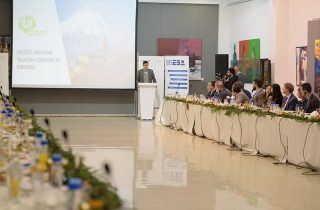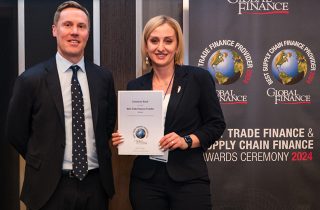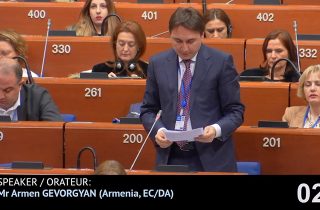Supervisory Committee lookեd into the “offshore case”

The RA Supervisory Committee (SC) has published an annual report for 2013. The report includes a lot of violations, however, some of them are new due to their nature. These new findings concern offshore companies that misspent funds of the Armenian budget.
The SP’s report writes that actives of non-resident companies in state procurement have significantly increased. The report estimates that privileged conditions for non-resident companies are risky in tenders as governmental bodies in Armenia are unable to control and supervise the procurement process by such companies in a duly fashion. In a word, a number of non-resident companies won tenders announced by the government and their behavior was strange.
For example, the amount of No 498 agreement for supplying food to 159 kindergartens in all administrative districts in Yerevan was AMD 2,577,746.4k in 2013. This agreement was serviced by a non-resident company named Tisa CJSC. Tisa company supplied the same sugar to the kindergartens in Shengavit community at a price of 490 drams / kg, while the same sugar was offered to kindergartens in Malatia-Sebastia community at 406 drams.
The same Tisa company and Avangard Ltd, both non-resident companies, won a tender to supply construction materials, clothing, and other products to the plenipotentiary coordination body of the Justice ministry. The amount of this agreement was AMD 127,619.6k.
The SC also highlights the fact that these non-resident companies were established artificially and acted as parties to agreements. The formula of such transactions is that a resident interested company creates a non-resident company or finds such a company to win a tender with privileged conditions. According to the report, as a result of such deeds non-resident companies become artificially imported parties, and funds are transferred out of the country. In this case supervision becomes inefficient as well.
The report brings examples, one of which is very interesting. In 2012 the government made agreement with Dakhkhan Ltd and Samvel Amirkhanyan SP to import livestock into Armenia. The company imported the livestock from Agro-Vest Plus s.r.o. company from the Czech Republic, which was established after the agreement was executed and funds were transferred. The director is Edik Amirkhanyan, who is the brother of consortium participant Dakhkhan Ltd director Radik Amirkhanyan and Samvel Amirkhanyan, who has a self-employed business in the Czech Republic. According to customs declarations, the customs amount for the livestock was AMD 1,371,195 (287,950.9k drams in total for 210 livestock cows) in case when the amount of the agreement was AMD 270,900.0 k. Thus, according to the shown documents, the consortium had a loss of AMD 17,050.9 k. The RA Agriculture Ministry made the agreement for 210 livestock but in fact they registered 230 cows in the name of the ministry. According to the documents of Agro-Vest Plus s.r.o., the buyer of all 230 cows is the Ministry of Agriculture but the payment was made by Dakhkhan Ltd.
There are other examples of transactions through intermediates as well. There have been situations when producers participated in tenders and did not win as formally their prices were high, however, their products were supplied dealers. For example the Ministry of Defense made a contract with Danini company for an amount of AMD 394,838.1 k to buy sugar at a price of 370 per kg. Danini company is neither an importer nor a producer, and bought sugar from Alex Grig company at a price of 360 kg per kilogram. In case of buying sugar from the importer directly the army would save AMD 9,781.6 k. The same company made a contract with the ministry to supply salt at a price of AMD 120 per kilogram; however they bought the salt from the Avan Salt Company at a rate of AMD 114 per kilogram. In case of buying from the producer directly the budget would save AMD 1,515.1 k drams.
The authors of the report say that some dealers have become so professional in such deals that they supply various products from different producers – all with different profiles resulting in higher costs and more losses from the budget funds.
The SC reports that due to negligent misrepresentation on the part of the tender bodies, companies that had the chance to make contracts with them earned additional profits and incurred losses from the budget. Throughout this mediated supply chain interests mediators are harmful to the real purpose and price of the products to be supplied. There were cases when after buying a certain type of equipment the government found out that they did not need such equipment. Or, there are cases when the government orders advisory services but in fact they do not need such services as there are no specific indicators.
However, the SP has found a very cautious explanation as it states that these shortcomings were not on purpose but as a result of ignoring the requirements of the government’s Decision 168 on procurement policies the companies do not research properly before buying and supplying the required products.
This means that they are bypassing the issue of kickbacks. What the report says, in fact, is that people are negligent and the mediator companies from offshore zones use these opportunities for their benefit.
There are very interesting examples in the SC report, which are very funny. For example, it states that due to a wrong vaccination by an Italian specialist who was paid 6.4 million drams the government lost 24 million drams. Another example is that the Agricultural Financing Institution project borrowed funds at an annual interest rate of 0.75% but offered 15-20% interest rate to farmers. These examples are available in the SC’s web site at www.coc.am .
By Babken Tunyan



























